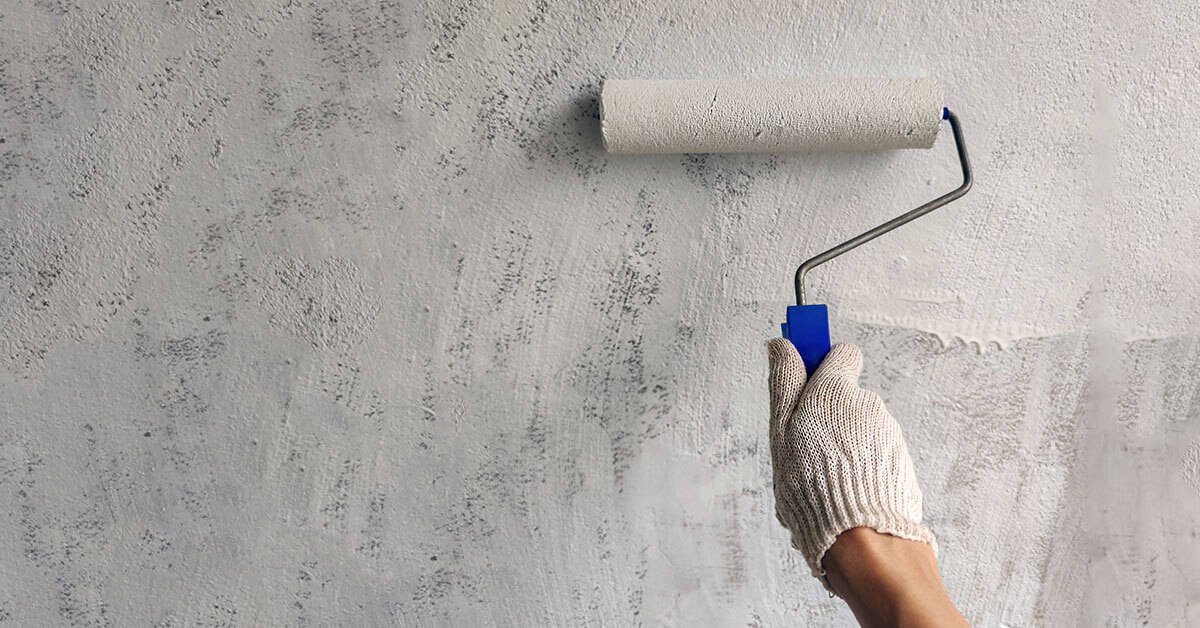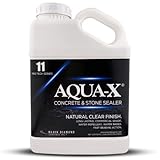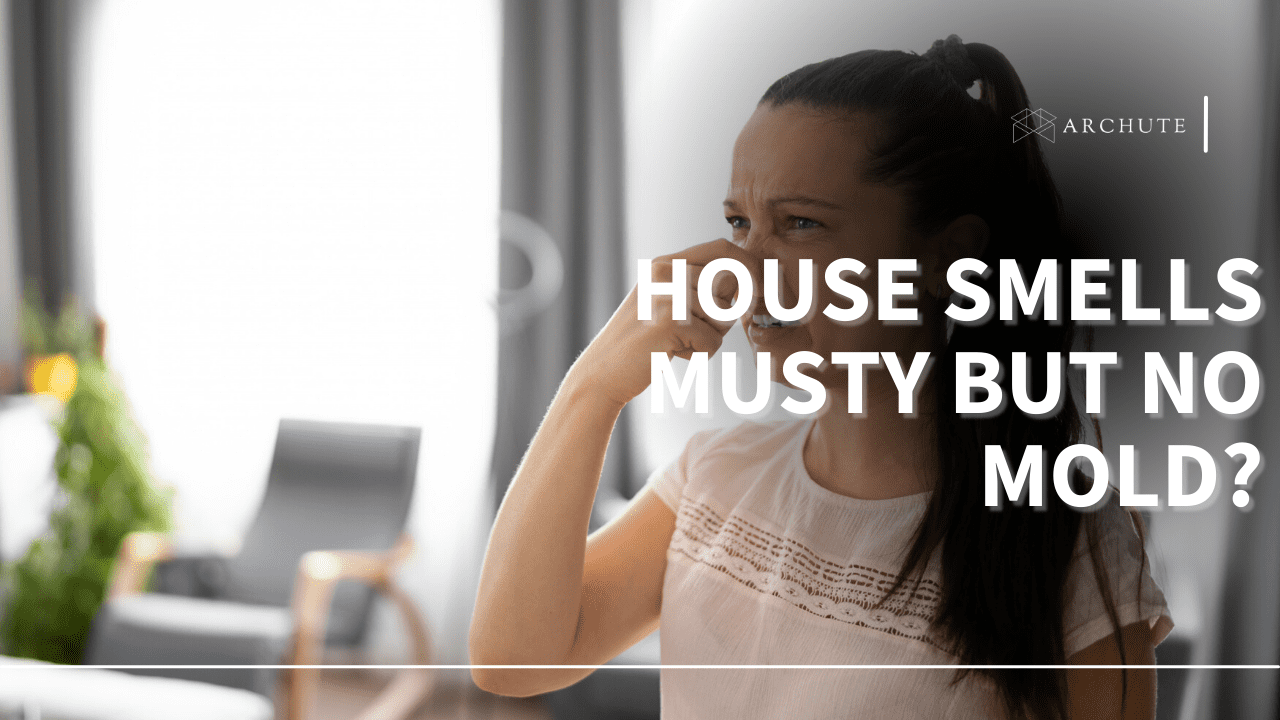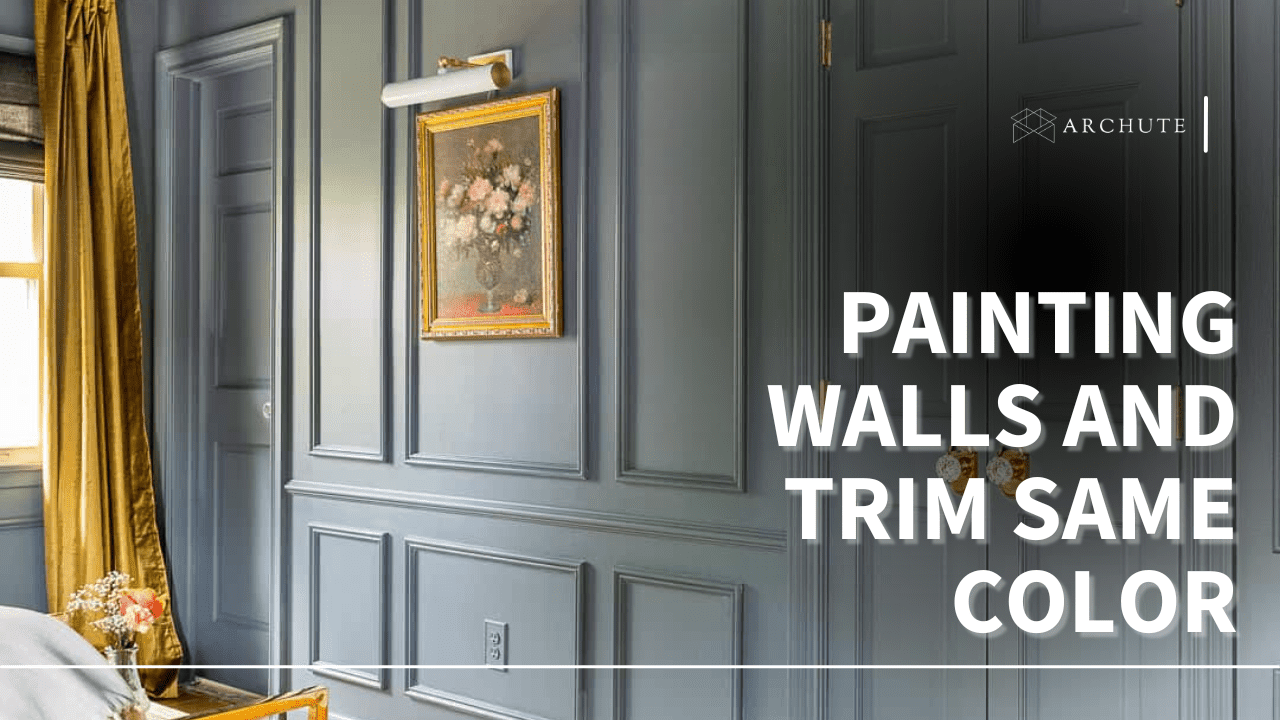Not just any paint is suitable for painting concrete basement blocks. The best paint for concrete basement walls can protect your foundation from damage and give you appealing visibility. Although these concrete paints have different chemical compositions, they are all designed to limit mold growth, mildew, efflorescence, and corrosion.
There are many different kinds of paint you can choose for your concrete walls. However, only a few paints are suited to painting concrete walls. For that reason, we have compiled a list of some of the best paint for concrete walls to make your decision-making process easy. But, before we look at the best products in this category, let's first understand why you should paint your concrete basement walls.
Why Should You Paint Concrete?
Painting your basement walls can do more than just enhance the look of your home. Concrete paints help to mask the surface discoloration and signs of wear and tear and extend the life of the concrete by limiting further damage.

Since most foundation walls allow humidity and humidity to seep into the basement, painting the walls will protect your wall from water and moisture damage. Using the best paint for concrete walls will seal small and medium-sized cracks. The paint will penetrate the concrete to seal cracks underneath the wall's surface.
There are also many health benefits associated with painted concrete walls. For example, if you suffer from allergies, painting the concrete will provide symptom relief by improving your air quality. Coating a concrete surface with paint will also make cleaning and maintenance easier.
Now that you understand why it is important to paint your concrete walls, let's go ahead and look at some of the best paint for concrete basement walls.
Rank | Product Image | Brand Name | Link |
|---|---|---|---|
1 | |||
2 | |||
3 | |||
4 | |||
5 | |||
6 |
1. Liquid Rubber Concrete Foundation and Basement Sealant Paint
- PROTECTIVE FINISH FOR - Foundations, ICF's, Basements, Shower...
- HIGHLY FLEXIBLE - Sealant final membrane has over 900% elongation...
- EASY TO APPLY - No mixing required! Apply by brush, roller or...
- ENVIRONMENTALLY FRIENDLY - Liquid Rubber Foundation Sealant is...
- FOR A BULLETPROOF SYSTEM - Bridge joints, seams, vents, gaps,...
The Liquid Rubber Concrete Foundation and Basement Sealants are among the concrete paint for basement walls. The sealant contains more than 900 percent of elongation in the sealing material that helps prevent adhesion failure that causes taring and cracks. Again, it contains a sealant material that allows the paint to spread over all the surface, providing a smooth finish.

image credit: L R
What we love most about this concrete paint is its eco-friendly feature, free of solvents and harmful odor. The paint is safe for humans and pets and can be used indoors and outdoors without special breathing apparatus. The paint also has a protective finish, making it ideal for basement walls and floors.
Interestingly, this waterproof paint is easy to apply and does not need mixing. All you need for the application process is a brush, roller, or paint sprayer. Also, unlike most concrete paints, we found that the liquid rubber concrete has a coverage area of 50 square feet.
Pros:
Cons:
2. INSL-X SU092209A-01 Sure Step Acrylic Anti-Slip Coating Paint
- Durable, skid resistant finish anti slip paint for interior or...
- High traffic slip resistant paint for concrete that’s ideal for...
- Fast drying, durable, easy application that fills and seals...
- 80 - 120 square foot coverage per gallon.
- On exterior applications, do not apply when rain is threatening....
INSL-X Acrylic Coating Paint is another of the best concrete paints we recommend because of its reliability and durability. Even though the paint does not have full coverage, you are guaranteed to get an even coating on concrete surfaces. In addition, the concrete paint resists abrasion, ensuring that the surface has the ideal texture.

image credit: INSL-X
Another reason why we recommend this product is that it's available in different color tones; hence you have multiple colors to choose from. The colors do not fade after years of use, thanks to the abrasion and water-resistant properties. This formula excellently fills up the concrete basement walls ensuring that you get long-lasting coverage.
Additionally, the paint takes a shorter time to dry, so you will not wait for long to add an extra coat. Apart from applying the paint on the basement walls, you can also apply it to the property's stairs, walkways, and patios. Also, one gallon of this paint can cover 80-120 square feet, ensuring you get an even coating.
Pros:
Cons:
3. KILZ Basement and Masonry Waterproofing Paint
- This premium, interior/exterior paint is formulated to waterproof...
- Using nanotechnology, this paint forms a barrier to help stop...
- Apply this paint on properly prepped and cured above and below...
- Prime all uncoated, patched, chalky, and adjacent wood and/or...
- This is a 1-gallon can of Interior/Exterior Basement and Masonry...
If you want basement paint that will keep water and dampness out, you definitely need waterproofing paint. KILZ Basement & Masonry Waterproofer will deliver a low luster enamel finish that endures on your concrete walls and floors through variable environmental conditions. It is also resistant to cracking, scuffing, fading, and peeling, making it highly durable.

image credit: KILZ
The wall and floor paint will also work perfectly on previously painted, stained, or primed surfaces, including masonry, wood, or metal. What we found amazing is that you can use the paint on multiple projects, like siding or trellises. Again, it dries and takes only a few to dry, allowing you to recoat.
What's more, the paint provides you with a smooth and evenly painted surface. Once you have applied it on the entire surface, there won't be a need for future repairing, which makes it a great option if you want to save on time, energy, and resources.
Pros:
Cons:
4. Eco Advance Concrete/Masonry Siloxane Waterproofer Concentrate
- Liquid concentrate formula makes 1 gallon of commercial grade...
- Ideal for use on concrete, brick, stucco, stone (natural and...
- Protects against water damage, oil, stains, mold, mildew,...
- Water-based, non-toxic, non-flammable formula does not harm...
- Vapor permeable (breathable) water proofer can be used on new...
Are you looking for the best eco-friendly paint options for sealing concrete walls? The Eco Advanced Waterproofer concrete paint has low VOC and low odor, making it safe for you and your pets. Amazingly, you can use this paint on almost any surface, including concrete, stone, pavers, and stucco.

image credit: paintzen.com
We had to include the Eco Advance paint because the paint will also protect the concrete from water damage, stains, mildew, and chemical spills. Again the paint is different from other waterproofing paint because it has vapor transmission abilities that allow substrate performance.
In addition, the spray-on formula gives long-lasting protection on most masonry surfaces. The application process for this product is pretty straightforward. You simply need to strip off the old paint and ensure the surface you are working on is free from dust, dirt, oils, grease, coatings, mildew, mold, and algae. Then mix a one-gallon container or sprayer of the paint with clean water and apply the paint using low-pressure spray equipment.
Pros:
Cons:
5. 1 Gal. AQUA-X 11 Clear Penetrating Stone and Concrete Sealer
- COLD WEATHER WARNING: Do not apply if temperature is expected to...
- Water-based, water-repellent sealer protects against stains,...
- Breathe easy when applying AQUA-X 11 Concrete Sealer due to NO...
- Your money goes farther with AQUA-X 11 Concrete and Stone Sealer:...
- Easy 1-coat spray-on application using our included Quick Start...
We picked Aqua-X Concrete Sealer as one of the best paints for concrete basement walls and floors because it is reasonably priced and is an industrial-grade sealer that will provide a long-lasting finish. In addition, this paint will lock out water and prevent mildew and mold growth. Amazingly the pain will also improve the durability of your concrete walls or unpolished floors.
Being water-based and water repellent, this paint will protect the walls and floors against stains, chemical spills, pitting, and salt damage. This means cleaning and maintenance of your basement will be much easier.
Furthermore, the application process is quite simple, and you can apply it without worry since it has low VOCs and no harsh odors. Therefore, you will not need extra protection while applying the paint, and you can safely use it indoors. Amazingly it will take around 2-4 years before you need resealing or repainting.
Pros:
Cons:
6. Rust Bullet DuraGrade Concrete High-Performance Concrete Coating
- EASY TO USE - Apply Directly to Concrete Without Acid Etching....
- EASY TO USE - Apply Directly to Concrete Without Acid Etching....
- DURABLE - Scratch, Chip, Chemical and UV Resistant
- VERSITILE - Ideal for Indoor or Outdoor Surfaces
- TOP QUALITY - The Premier Garage Floor Paint and Concrete Paint
Rust Bullet DuraGrade Concrete High-Performance Concrete Coating is another reliable and perfect product you could use on your basement wall and floor. We recommend this paint because it provides wide coverage and is a durable mix that will reduce the need to prepare the wall before painting.

Image credit: RUST BULLET
Understandably, it is super easy to use, and professional painters or even beginners can use it. You can apply the paint with a brush, roller, or sprayer. This paint also boasts of its advanced technology, assuring you of excellent water resistance, excellent adhesion, and waterproofing protection.
Further so, it is an ideal option for most people since it can be used in garages, patios, sidewalks, and pools. The Rust Bullet DuraGrade paint features a durable coating 20 times thicker than regular paint, making it more long-lasting. In addition, you can cover up to 40 square feet with one gallon as one coat.
Pros:
Cons:
Factors to Consider When Purchasing the Best paint for concrete walls

image credit: contentgrid.homedepot-static.com
1. Type of Paint
Though there are different kinds of paint for concrete walls, some types are better suited for concrete walls. Understanding the different kinds of concrete wall paints will help you pick the best paint for your walls.
a) Acrylic Latex Paint
Acrylic paints are water-based, and they are pretty easy to spread. These paints are perfect for almost all Mansory and concrete projects. The acrylic latex paint does not need any special brushes, rollers, or complex tools for the application. The best part is that the paints are more affordable than most concrete walls. Although these paints are the most affordable option, it is not the most durable option
b) Epoxy paint
Epoxy paint is usually made up of two main liquid components: epoxy resin and hardener. This paint creates a tough, solvent-resistant finish that can be used on your concrete wall or floor.
The ability of this paint to be able to resist water and stains helps to keep your walls beautiful for a longer period. Unfortunately, epoxy paints come in kits requiring you to mix resin and hardeners manually. This makes them a bit hard to apply paint compared to acrylic paints.
c) Concrete sealer
Concrete sealers are the paint applied to concrete walls to protect surfaces from damage, staining, and corrosion. In addition, concrete or cement sealers are applied on bare and painted concrete floors to offer resistance to stains and chemicals.
d) Concrete primer
Concrete primer is uniquely designed to absorb into the concrete surface. Basically, this is a product used to create a smooth surface for the main paint. The primers usually dry in a few hours, so you should apply the prime like eight hours before applying paint.
2. Maintenance
While almost all concrete wall paint requires some maintenance, some products need more care than others. Check the label to see the maintenance required for the product you pick and whether it has simple maintenance. For example, you will find that some paints require you to wax and polish them regularly, while others don't.
3. Color retention
Another factor you will need to consider before purchasing paint for your basement walls is the nature of color retention. You don't want to purchase paints that will fade off after a short period, so you need to check the label to know the retainability nature of the paint. Amazingly, most paint manufacturers have color retention qualities as their priority.
4. Finish
Concrete paints come in various finishes, from glossy to matte. When you want to paint concrete basement walls, you must first determine which type of finish you want. Most paints will indicate the type of finish it leaves on the label. Basically, the ultimate choice will depend on a personal preference. However, it is of the essence to note that the matte paints will hide dirt or flaws better than the glossy versions.
5. Durability
It is recommended that you repaint your concrete walls after a few years. However, the number of years will vary depending on the product you pick. This means it is paramount to pick a durable product for better durability.
Again, it is necessary to note that some paints will last longer if you prime the concrete before painting. Checking the label will help determine the durability of the product. If you intend to change the color of your walls after a few years, you should find a product that is not as permanent.
6. Cost
Concentration paints are available at different prices, but most are relatively available. The pricing varies depending on various factors like the components used in the paint and the brand. However, you will find that some of the lower-priced paints have few features, while the high-end products have extra features. So before making a purchase, you will need to plan to get the best pain to get the job done perfectly.
Step by Step Guide on How to Paint a Concrete Wall or Floor

Image credit: rethority.com
Concrete paint is a bit thicker than regular paint, and the application process is not the same. While you can paint a regular wall in two or three days, you will need a week or so to finish painting concrete. Here is how to paint concrete walls:
Step 1: Strip Old Paint
Before you begin painting the walls, you will need to get rid of any old paint on the basement walls. For this step, you will use a wire brush, paint scraper, and elbow grease. You can also try to use a power washer if your basement is well ventilated.
Step 2: Clean the Concrete walls

image credit: hips.hearstapps.com
Then, you will need to clean the concrete walls to help get rid of any trapped dirt, grease, and oil on the wall. You can use trisodium phosphate or a pre-paint cleaning solution to remove dirt and grease. Use a pressure washer to get rid of any mold growth and efflorescence that could be on the foundation.
Step 3: Seal the Concrete wall
Sealing the basement walls is another very crucial step that you will need to do before painting. This step will help prevent moisture from seeping in and, in turn, prevent mold growth. You can use masonry paint or sealer. Whichever sealant you use, ensure that you carefully follow the directions for mixing, applying, and curing.
Step 4. Prime the Concrete

image credit: contentgrid.homedepot-static.com
Although priming the basement walls is not compulsory, it will help fill pores and prepare the wall for painting. You can use an exterior grade block filler and bonding primer for the concrete basement wall. It is necessary to remember that the best paint primer dries in two to eight hours, depending on the type of product you use.
Step 5. Paint the Concrete basement walls

image credit: familyhandyman.com
After that, you will paint the interior concrete walls with the best paint. You will apply it using a painting brush, high-capacity roller, or texture roller. You can also spray paint your wall using a sprayer. But regardless of the method you apply, you should let the paint dry for at least a bay between coats.
Frequently Asked Questions on best paint for concrete basement walls
1. What is the difference between concrete paint vs. stain?
Concrete stain and paint merge with the concrete's porosity and permeability differently. The paint coats the surface with a thin film that traps moisture, damaging concrete over time. The paint fills the pores on the surface, giving you an even look. The only downside is that the concrete paint will not last as long as the stains.
Stain, however, colors the porous concrete surface without sealing it, meaning there will be a free flow of moisture in and out of the walls. As a result, the stains will give the concrete basement walls longer-lasting coverage. The problem is with the stain, you will most likely end up with uneven coverage, and there is a high possibility of mold growth.
2. Does concrete paint require a sealer?
Most concrete paint brands recommend that you should at least repaint your walls every 3-5 years. Applying a concrete sealer will add an extra layer of protection to painted concrete, extending its durability. A good concrete sealer can last 5-10 years, which is worthwhile. Although the walls will get scratches or peel off over time, applying concrete sealers will help.
The amazing bit is that the sealer is applied the same way you apply concrete paint. However, unlike concrete paint, the sealer dries quickly, taking less than 24 hours.
image credit: islandpaints.com





















